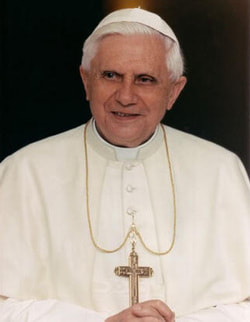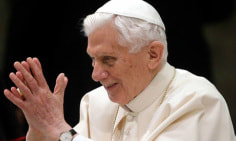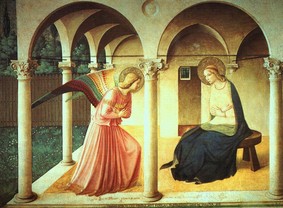|
A major contention that many people – both young and old – have with the Church is that it is an institution of “Thou Shalt Nots” and other moral imperatives that have little or no relevance in the modern world. In essence, the Church is seen as little more than an outdated social services agency, or even worse, a dismal and ahistorical museum perpetuating a false sense of reality. This emerging perception of the Church parallels a larger cultural shift from the acceptance of objective truth toward a secular relativism.
In a recent address to a group of U.S. bishops in Rome for their ad limina visit, Pope Benedict XVI proposed that the Church’s response to this “eroded” perception of reality is one of the greatest “spiritual and cultural challenges of the new evangelization.” Because of the Catholic Apostolate Center’s commitment to being an instrument of the new evangelization, this bears much significance on the direction of our work. But what impact does – or should – this emerging situation have on our daily lives? In the words of the Holy Father, “the Church in the United States is called, in season and out of season, to proclaim a Gospel which not only proposes unchanging moral truths but proposes them precisely as the key to human happiness and social prospering”. As Catholics, we are called to uphold the perceptive vision of reality that has been gifted to us by the Holy Spirit through Divine Revelation. It is only through upholding this vision that we can ever hope to accurately understand our place in the world around us and “the deepest truth about our being and ultimate vocation, our relationship to God.” As Catholics, we are beneficiaries of an astonishing intellectual legacy that was developed over the course of two millennia by scholars who examined these mysteries through the complimentary lenses of faith and reason. Contrary to popular opinion, the Church’s moral teaching is not merely a hodge-podge of archaic prohibitions, but a doctrine that is congruent with the logical nature of reality and informed by Divine Revelation. As the Pope explained in his address, the moral teaching of the Church “is not a threat to our freedom, but rather a ‘language’ which enables us to understand ourselves and the truth of our being, and so to shape a more just and humane world. She thus proposes her moral teaching as a message not of constraint but of liberation, and as the basis for building a secure future.” If we are to succeed in being apostles of the New Evangelization, then one of our most critical objectives should be to proclaim the beauty, consistency, and relevance of the Church’s moral teaching, without which we would be left with an incomplete view of our own humanity. Informed by this teaching, it is also important that we serve as prophets in the public sphere of these truths. As Pope Benedict XVI emphasized, “it is imperative that the entire Catholic community in the United States come to realize the grave threats to the Church’s public moral witness presented by a radical secularism which finds increasing expression in the political and cultural spheres.” Even more pertinent to the work of the Catholic Apostolate Center, the Holy Father went on to say that “the preparation of committed lay leaders and the presentation of a convincing articulation of the Christian vision of man and society remain a primary task of the Church in your country; as essential components of the new evangelization, these concerns must shape the vision and goals of catechetical programs at every level.” Blessed John XXIII was once quoted as saying the following: “We are not on earth to guard a museum, but to cultivate a flourishing garden of life.” The New Evangelization is not concerned with re-presenting a forgotten memory from the past, but with re-proposing the living and eternal truth of Jesus Christ that continues to sustain His Church. The Church’s moral teaching is just one part of this truth, but as the Holy Father makes clear, it is an essential part to humanity’s self-understanding. Brett Garland is a Collaborator with the Catholic Apostolate Center. Audio of the Holy Father’s address available here. CNS Report about the Holy Father's address. Editor's Note: This post was originally published in 2012.
0 Comments
A major contention that many people – both young and old – have with the Church is that it is an institution of “Thou Shalt Nots” and other moral imperatives that have little or no relevance in the modern world. In essence, the Church is seen as little more than an outdated social services agency, or even worse, a dismal and ahistorical museum perpetuating a false sense of reality. This emerging perception of the Church parallels a larger cultural shift from the acceptance of objective truth toward a secular relativism.
In an address given in 2012 to a group of U.S. bishops in Rome for their ad limina visit, Pope Benedict XVI proposed that the Church’s response to this “eroded” perception of reality is one of the greatest “spiritual and cultural challenges of the new evangelization.” Because of the Catholic Apostolate Center’s commitment to being an instrument of the new evangelization, this bears much significance on the direction of our work. But what impact does – or should – this emerging situation have on our daily lives? In the words of the Holy Father, “the Church in the United States is called, in season and out of season, to proclaim a Gospel which not only proposes unchanging moral truths but proposes them precisely as the key to human happiness and social prospering”. As Catholics, we are called to uphold the perceptive vision of reality that has been gifted to us by the Holy Spirit through Divine Revelation. It is only through upholding this vision that we can ever hope to accurately understand our place in the world around us and “the deepest truth about our being and ultimate vocation, our relationship to God.” As Catholics, we are beneficiaries of an astonishing intellectual legacy that was developed over the course of two millennia by scholars who examined these mysteries through the complimentary lenses of faith and reason. Contrary to popular opinion, the Church’s moral teaching is not merely a hodge-podge of archaic prohibitions, but a doctrine that is congruent with the logical nature of reality and informed by Divine Revelation. As the Pope explained in his address, the moral teaching of the Church “is not a threat to our freedom, but rather a ‘language’ which enables us to understand ourselves and the truth of our being, and so to shape a more just and humane world. She thus proposes her moral teaching as a message not of constraint but of liberation, and as the basis for building a secure future.” If we are to succeed in being apostles of the New Evangelization, then one of our most critical objectives should be to proclaim the beauty, consistency, and relevance of the Church’s moral teaching, without which we would be left with an incomplete view of our own humanity. Informed by this teaching, it is also important that we serve as prophets in the public sphere of these truths. As Pope Benedict XVI emphasized, “it is imperative that the entire Catholic community in the United States come to realize the grave threats to the Church’s public moral witness presented by a radical secularism which finds increasing expression in the political and cultural spheres.” Even more pertinent to the work of the Catholic Apostolate Center, the Holy Father went on to say that “the preparation of committed lay leaders and the presentation of a convincing articulation of the Christian vision of man and society remain a primary task of the Church in your country; as essential components of the new evangelization, these concerns must shape the vision and goals of catechetical programs at every level.” Blessed John XXIII was once quoted as saying the following: “We are not on earth to guard a museum, but to cultivate a flourishing garden of life.” The New Evangelization is not concerned with re-presenting a forgotten memory from the past, but with re-proposing the living and eternal truth of Jesus Christ that continues to sustain His Church. The Church’s moral teaching is just one part of this truth, but as the Holy Father makes clear, it is an essential part to humanity’s self-understanding. Brett Garland is a Collaborator with the Catholic Apostolate Center. Audio of the Holy Father’s address available here. CNS Report about the Holy Father's address. Editor's Note: This Post was originally published on January 21, 2012 Behold! Christus Resurrexit! Happy Easter! We have fifty days to celebrate the joyous occasion of Christ rising and the promise of feasting at the eternal banquet! What more do I even need to write? Growing up, I saw Easter as a time to put on my white tights and gloves, wear a flurry floral print dress, and fill my tummy with all the best-tasting jellybeans. Intermixed with the secular rituals of the Easter bunny and hunting for eggs, I found it to be glorious. As I have matured in age and in faith, Easter has become a much more profound experience. The wonderful thing about being a Catholic Christian is that the celebration does not last for one day alone. We celebrate this greatest of solemnities for fifty days, but the journey to understanding it’s the Paschal Mystery lasts a lifetime. Will we ever tire of the feasting and revelry in that truth? We can uncover some of the answers to that question in one word: behold.
Since Advent of this past year, I’ve been struck by the word “behold” in Scripture. There are a myriad of voices that bring a message of change and renewal. The story of the Annunciation with the angel Gabriel and Mary is one poignant example. “Do not be afraid; for behold, I proclaim to you good news of great joy…(Lk 2:10)” and “Behold, I am the handmaid of the Lord (Lk 1:38).” The other instance I turn to is in the Liturgy of the Eucharist, also coming from the voice of Scripture, “Behold the Lamb of God. Behold him who takes away the sins of the world. Blessed are those who are called to the Supper of the Lamb(Jn 1:29).” Not once, but twice are we asked to “behold” God’s love for us in the Incarnate Word, Mary’s “yes,” and the sacrificial lamb who died because of sin and calls us to humility. To be, and to hold. This is where Christ asks us to make him the beginning and end of our lives. To be with him in stillness and consider how we are “holding our treasure in earthen vessels (2Cor 4:7).” What better time to be and to hold then during the Easter Season. This was a buzzword as I waited in joyful expectation during this past Advent. Yet, another verse with the word surfaced during the desert period of Lent. “Behold, I make all things new” Christ relates to John in Revelation. (Rev 21:5)Gabriel and Mary’s “behold” has become an invitation to change and renewal in daily life. We celebrate the chance to experience this renewal in the mystery of the Resurrection. Christ has made things new for us! I personally have experienced a professional renewal and I can sense, after my Lenten resolutions, a change in my awareness. I have come to reflect more on thoughts and reactions, to be patient with others, and to revitalize relationships. I know that what brought me to this place during Lent is the hope of the cross and taking time to “behold” the mystery of God’s love. So, I guess there was more for me to write! Even though we have the vision of the eternal banquet does not mean we can rest there, perhaps relating to how Peter, James, and John wish to pitch tents after witnessing the glory of the Transfiguration.(Mt 17:1-8) The renewal that we are called to is painful and oftentimes uncomfortable. Slow, patient, gentle change can lead to a new outlook on habits, mistakes, perspectives, maybe even relationships that have imprisoned us. “If you saw the face of God and Love, would you change?” the artist Tracy Chapman sings in her song “Change.” We have the opportunity to see that face, and we celebrate it during the Easter Season. Let’s do a little dance in celebration and remember the challenge to “behold” this mystery and renew our hearts. Sophie Jacobucci serves as an Echo Apprentice in the Diocese of Manchester, NH. A major contention that many people – both young and old – have with the Church is that it is an institution of “Thou Shalt Nots” and other moral imperatives that have little or no relevance in the modern world. In essence, the Church is seen as little more than an outdated social services agency, or even worse, a dismal and ahistorical museum perpetuating a false sense of reality. This emerging perception of the Church parallels a larger cultural shift from the acceptance of objective truth toward a secular relativism.
In a recent address to a group of U.S. bishops in Rome for their ad limina visit, Pope Benedict XVI proposed that the Church’s response to this “eroded” perception of reality is one of the greatest “spiritual and cultural challenges of the new evangelization.” Because of the Catholic Apostolate Center’s commitment to being an instrument of the new evangelization, this bears much significance on the direction of our work. But what impact does – or should – this emerging situation have on our daily lives? In the words of the Holy Father, “the Church in the United States is called, in season and out of season, to proclaim a Gospel which not only proposes unchanging moral truths but proposes them precisely as the key to human happiness and social prospering”. As Catholics, we are called to uphold the perceptive vision of reality that has been gifted to us by the Holy Spirit through Divine Revelation. It is only through upholding this vision that we can ever hope to accurately understand our place in the world around us and “the deepest truth about our being and ultimate vocation, our relationship to God.” As Catholics, we are beneficiaries of an astonishing intellectual legacy that was developed over the course of two millennia by scholars who examined these mysteries through the complimentary lenses of faith and reason. Contrary to popular opinion, the Church’s moral teaching is not merely a hodge-podge of archaic prohibitions, but a doctrine that is congruent with the logical nature of reality and informed by Divine Revelation. As the Pope explained in his address, the moral teaching of the Church “is not a threat to our freedom, but rather a ‘language’ which enables us to understand ourselves and the truth of our being, and so to shape a more just and humane world. She thus proposes her moral teaching as a message not of constraint but of liberation, and as the basis for building a secure future.” If we are to succeed in being apostles of the New Evangelization, then one of our most critical objectives should be to proclaim the beauty, consistency, and relevance of the Church’s moral teaching, without which we would be left with an incomplete view of our own humanity. Informed by this teaching, it is also important that we serve as prophets in the public sphere of these truths. As Pope Benedict XVI emphasized, “it is imperative that the entire Catholic community in the United States come to realize the grave threats to the Church’s public moral witness presented by a radical secularism which finds increasing expression in the political and cultural spheres.” Even more pertinent to the work of the Catholic Apostolate Center, the Holy Father went on to say that “the preparation of committed lay leaders and the presentation of a convincing articulation of the Christian vision of man and society remain a primary task of the Church in your country; as essential components of the new evangelization, these concerns must shape the vision and goals of catechetical programs at every level.” Blessed John XXIII was once quoted as saying the following: “We are not on earth to guard a museum, but to cultivate a flourishing garden of life.” The New Evangelization is not concerned with re-presenting a forgotten memory from the past, but with re-proposing the living and eternal truth of Jesus Christ that continues to sustain His Church. The Church’s moral teaching is just one part of this truth, but as the Holy Father makes clear, it is an essential part to humanity’s self-understanding. Brett Garland is the Program Development Coordinator for the Catholic Apostolate Center. Audio of the Holy Father’s address available here. CNS Report about the Holy Father's address. |
Details
Archives
July 2024
Categories
All
|
About |
Media |
© COPYRIGHT 2024 | ALL RIGHTS RESERVED




 RSS Feed
RSS Feed